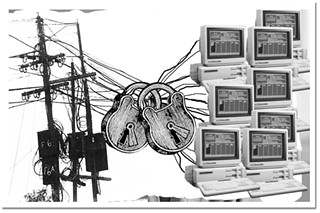Even the information superhighway has speed limits—limits that are enforced without you even knowing about it. It's called "traffic shaping" and most internet service providers have some form of it in place.
Michael Geist, the Canada Research Chair of Internet and E-Commerce Law at the University of Ottawa, defines traffic shaping as "ISPs limiting the amount of bandwidth available for particular kinds of applications.
"They'll tell you they do that because there are certain applications that hog the bandwidth," says Geist. "The ISP wants to limit the amount of bandwidth made available to applications used for peer-to-peer file sharing, like Limewire and BitTorrent."
A former Eastlink server administrator, requesting anonymity because of non-disclosure agreements, says that traffic shaping is mostly to "maintain the quality of the network." He says Eastlink looks at all the traffic on its network and sees what the majority of users are doing, then prioritizes the traffic.
"Most of the traffic would be like MSN, web browsing, email," the former employee of five years says. "They'll say, "Alright, web browsing gets top priority on our network.' Meanwhile, P2P traffic, they'll say, "This only gets this chunk of speed on our network.'"
He says Ellacoya Networks makes Eastlink's traffic-shaping platform. Ellacoya's website says that it provides "a complete and scalable solution for building intelligent broadband networks—creating both cost savings and new revenue opportunities." The platforms they make enable service providers to "dramatically increase their return on network investment by managing traffic at a subscriber and application level."
Eastlink customer Harold Jenks says he's been in an "ongoing battle" with Eastlink for months. He doesn't want his real name used for fear of Eastlink further throttling his bandwidth. He says he should be able to upload data at a rate of 125 kilobytes per second but, on occasions when he uses Limewire, his upload speed is sometimes "frozen at three kilobytes per second."
He says people are not getting their money's worth out of their connection when downloading music or movies.
"I sympathize with to some extent," Jenks says. "But I do not agree with the severity that are applying."
Geist says some ISPs have acknowledged that they engage in traffic shaping, "though they still don't include any information on their websites to that effect."
Calling the Eastlink customer service line and asking about traffic shaping point blank results in a candid response. Adam, of the Eastlink customer service line, explains that "torrents won't be able to take advantage of the full connection." However, he's "not sure the exact speed it goes and gets throttled back to."
"Eastlink focuses on prioritisation instead of a usage-based system," says Steve Irvine, Eastlink's director of internet engineering and operations. "This approach has allowed us to provide the best possible experience for time-sensitive applications. By continuing to invest in our network we also ensure that P2P applications perform extremely well on our network—but not at the expense of the more sensitive applications."
Isabelle Robinson, public affairs manager for Bell Aliant, says Aliant does not use a traffic-shaping platform.
Cameron Fenton, a student at Saint Mary's University, who admits to sometimes transferring as much as 270 gigabytes in a month, thinks traffic shaping is a good thing. "Just because your neighbour is downloading three or four hundred gigs of movies or TV shows doesn't mean that you should suffer and have your browsing slowed down."
Geist says if ISPs have users spending time eating up bandwidth with bittorrent downloads, "the obvious solution is to move to a "pay as you use' system, so those using large amounts of bandwidth pay for it."
He says the reluctance on the part of the ISPs is that while they may have a fair amount of high bandwidth users, they have far more users that use very little bandwidth. "If those customers were able to switch to a "pay as you use', their bills would decline dramatically."










